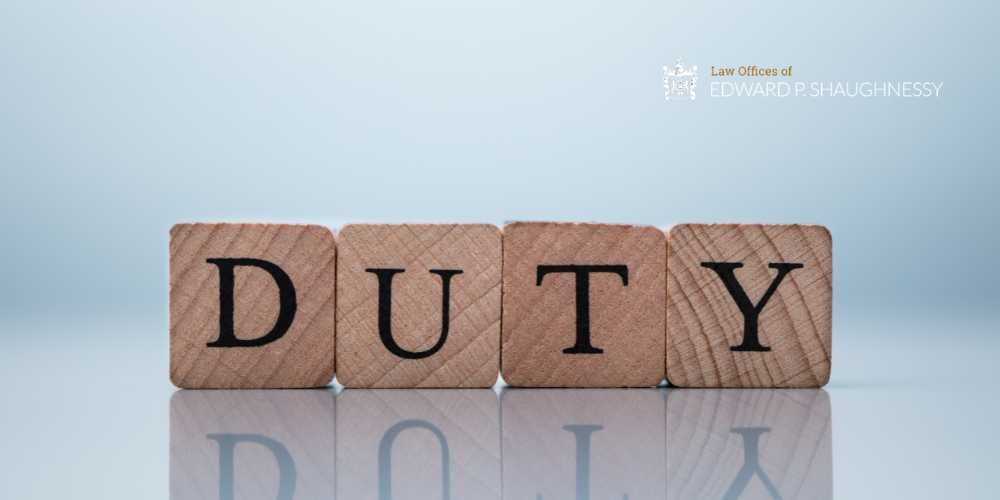A breach of duty in Pennsylvania occurs when someone fails to act responsibly, and another person suffers serious harm because of it. In a negligence case, if a defendant breached a breach of duty of care, the defendant’s conduct failed to meet a legal duty to exercise reasonable care, or the defendant’s conduct was outside of the reasonable person standard. If the defendant’s breach of duty causes another person harm, they can be held accountable in a personal injury case.
If you’re an injury victim because another party breached their duty of care, contact The Law Offices of Edward P. Shaughnessy in Easton, PA, for a free consultation.
Breach of Duty Definition
In law, “breach” refers to a violation of a legal responsibility or legal duty. In personal injury law, breach is one of the four elements of a negligence claim, describing a failure to abide by a duty of care to another.
What is a Breach of Duty of Care?
A duty of care means that a person has a legal responsibility to avoid harming anyone else. Duty of care can arise from law, relationships, or customs.
In a personal injury case, establishing that a person owes a duty of care and that the defendant breached this duty is key. This breach of duty must result in harm to the accident victim, as one of the other elements of negligence law.
How The Reasonable Person Standard Applies to The Duty of Care
The reasonable person standard measures a defendant’s conduct against what an average person would do under the same circumstances or similar circumstances. A reasonable person typically acts using common sense and reasonable care to avoid potential harm to others.
So, if a driver causes a car accident because they failed to obey traffic laws and drive safely by running a stop sign, they could be ordered to pay the injury victim for the damages their breach of duty caused. This is because a jury would likely determine that a reasonable person would obey traffic laws to avoid hurting other drivers or pedestrians.
However, minors are not held to the same common sense or reasonable person expectations. Children do not understand dangerous activities or “duties,” so how could they breach a duty of care? Under attractive nuisance laws, property owners must protect children from dangerous conditions. So, for example, if a store owner leaves a ladder accessible and a child gets injured, the store owner may be liable.
A child injury lawyer in Easton at The Law Offices of Edward P. Shaughnessy can help you understand whether or not another party breached their duty.
What is a Fiduciary Duty?
Fiduciary duty refers to a legal obligation where one party, known as the fiduciary, must act in the best interest of another party, known as the beneficiary.
- Breach of Duty: This generally refers to a failure to uphold a standard of care or responsibility that one person owes to another. This applies across different contexts, such as in a negligence claim or failure to meet contractual obligations.
- Breach of Fiduciary Duty: This applies when a person in a fiduciary relationship (such as a trustee, executor, attorney, or corporate officer) fails to act in the best interests of another party.
What Constitutes a Breach of Fiduciary Duty in Medical Malpractice Lawsuits?
A breach of fiduciary duty in medical malpractice lawsuits happens when a doctor does not provide the expected standard of medical care, leading to potential harm. For example, if a doctor fails to diagnose a condition that a competent doctor would have identified, they have breached their duty.
If you suspect this has occurred, contact an Easton medical malpractice attorney for a free consultation.

How Duty of Care Helps Establish Liability in Negligence Claims
In a negligence claim, the plaintiff’s lawyer must prove negligence by establishing:
- The defendant owed a duty of care.
- The defendant breached this duty.
- The defendant’s breach caused harm to the plaintiff.
- The plaintiff suffered damages.
These four elements—duty, breach, causation, and damages—are necessary to prove negligence. Duty of care requires the defendant to act with reasonable care to avoid harming others, forming the basis for holding them accountable when they fail to act as a reasonable person would under the same circumstances.
The Defendant Owed a Duty of Care
In Pennsylvania, when a defendant owes a duty of care, they have a legal responsibility to act safely to prevent harm. This duty exists when the defendant’s actions or relationship with the injured party requires careful conduct.
For example, if a defendant volunteered to repair a loose railing and did so improperly, causing injury, they have breached their duty.
The Defendant Breached the Duty of Care
If a defendant breached the duty of care, it means they failed to act as a reasonable person would under the same or similar circumstances.
The Defendant’s Breach Caused Injury or Harm
If duty of care exists and was breached, the defendant can only be liable if the defendant’s breach of duty caused harm to the injury victim.
For instance, if someone breached their duty but this breach of duty didn’t hurt anyone, they cannot be held responsible by law.
The Plaintiff Suffered Damages
In Pennsylvania, if the defendant’s actions caused harm to the plaintiff, the defendant can be held responsible for the plaintiff’s injuries.
Breach of Duty of Care Examples
Here are a few common examples of a breach of duty of care:
- Drivers owe other drivers a duty of care to drive safely and obey traffic laws. Traffic laws legally impose this duty on drivers. If a driver fails to obey traffic laws and causes a car accident, resulting in serious harm to other drivers, this is a breach of duty to drive safely.
- Healthcare providers have a duty to provide a proper standard of medical care. If medical professionals act outside of this standard, this is a breach of duty.
- Property owners have a duty to maintain safe premises for guests or potential trespassing children under attractive nuisance laws. If a property owner doesn’t address dangerous conditions on their property, they have potentially breached their duty to maintain safe premises.
In all cases, the duty of care exists because the party owes it to others to act responsibly to avoid causing harm.
How a Breach of Duty Occurs in a Negligence Case
A breach of duty occurs in a negligence case when the at-fault party fails to act responsibly, causing harm. For example, if property owners neglect to fix issues on their premises when visitors injure themselves, they can be found negligent.
An Easton slip and fall lawyer can help prove negligence by showing the property owner failed to maintain safe conditions, leading to the injury.

How a Breach of Duty Occurs in a Strict Liability Case
In strict liability cases, a breach of duty occurs without proving negligence because the defendant’s breach of duty was against the law or was a prohibited activity.
Common examples of strict liability cases include:
- Abnormally dangerous activities: These include activities that will always carry a foreseeable risk of severe harm, and defendants can be held strictly liable to the personal injury victim. This can include experimenting with explosives, nuclear power, and other abnormally dangerous activities reasonable people would not explore.
- Product liability cases: Every product manufacturer and distributor has a duty of care to ensure products they produce or promote do not hurt consumers. Defective product manufacturers or distributors can be held strictly liable. Contact an Easton product liability lawyer to learn more.
- Wild animal ownership and dog bites: Wild animal ownership creates a foreseeable risk of danger. However, all pet owners have a duty to protect the community from their pets. If a dog bites someone, the dog’s owner can be held strictly liable for the plaintiff’s injuries. Likewise, if a person owns a wild animal that attacks someone, the owner can be held strictly liable. If you’ve been injured by a dog or other pet attack, contact an Easton dog bite lawyer for a free consultation regarding a potential strict liability case.
Duty Breach Causation Damages
In civil cases, proving negligence involves duty, breach, causation, and damages. Duty means the defendant had a legal obligation to the plaintiff. A breach occurs when this duty is not met. Causation links the breach to the harm suffered. If the jury finds the defendant negligent, the plaintiff can recover damages in a personal injury case.
How an Easton Personal Injury Lawyer Can Help
Personal injury cases cover practice areas involving civil cases for car accidents, premises liability cases, etc. An experienced attorney can help you recover compensation by helping gather evidence, negotiating with the insurance company, and addressing the aspects of negligence law.
Our Easton, PA, personal injury lawyers understand what’s required to build strong personal injury cases to help ensure the at-fault party is found negligent in every strict liability or negligence case they take on. Call (610) 258-9955 to schedule a free personal injury case evaluation.






